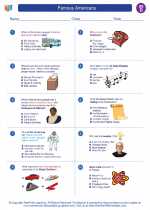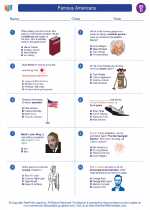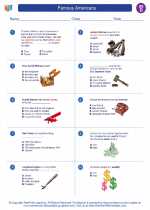Christopher Columbus
Christopher Columbus was an Italian explorer who completed four voyages across the Atlantic Ocean, opening the way for widespread European exploration and the eventual conquest of the Americas by Europeans. He is credited with "discovering" the New World, although this claim has been disputed due to the presence of indigenous peoples in the Americas prior to his arrival.
Early Life of Christopher Columbus
Christopher Columbus was born in 1451 in the Republic of Genoa (now part of Italy). He began his maritime career as a teenager and gained experience in navigation and trade. Columbus was inspired by the travels of earlier explorers and sought support for his own voyages to find a westward route to Asia.
First Voyage and "Discovery" of the New World
In 1492, Columbus set sail from Spain with three ships—the Niña, the Pinta, and the Santa Maria. After a challenging journey, he reached the islands of the Caribbean, which he believed to be the outskirts of Asia. This event is often celebrated as the "discovery" of the Americas by Europeans, although it had a profound impact on the indigenous peoples who had already been living in the region for thousands of years.
Subsequent Voyages and Legacy
Columbus completed three more voyages to the Caribbean and South America, during which he encountered various indigenous peoples and explored the coasts of Central and South America. His voyages had a lasting impact on the world, leading to increased European exploration and colonization of the Americas. However, Columbus' legacy is also controversial due to the negative consequences for indigenous populations, including disease, forced labor, and cultural disruption.
Study Guide
- What was the nationality of Christopher Columbus?
- Identify the ships that Columbus used on his first voyage.
- Where did Columbus initially believe he had landed?
- What impact did Columbus' voyages have on the Americas?
- Discuss the controversies surrounding Columbus' legacy.
- Columbus was born in the Republic of Genoa.
- The ships used on his first voyage were the Niña, the Pinta, and the Santa Maria.
- Columbus initially believed he had landed on the outskirts of Asia.
- Columbus' voyages led to increased European exploration and colonization of the Americas.
- The controversies surrounding Columbus' legacy include the negative consequences for indigenous populations, such as disease, forced labor, and cultural disruption.
[Christopher Columbus] Related Worksheets and Study Guides:
.◂Social Studies Worksheets and Study Guides Fourth Grade. Famous Americans

 Worksheet/Answer key
Worksheet/Answer key
 Worksheet/Answer key
Worksheet/Answer key
 Worksheet/Answer key
Worksheet/Answer key
